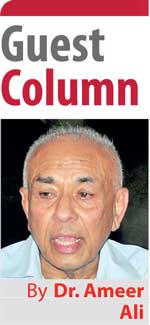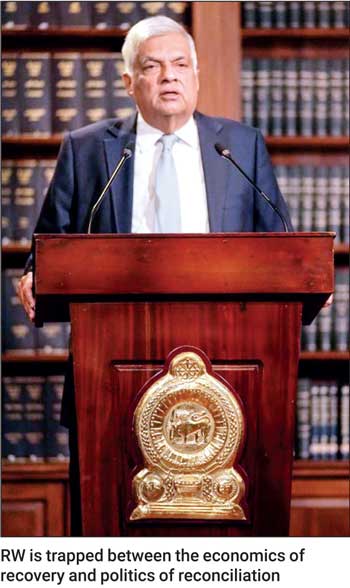Monday Feb 23, 2026
Monday Feb 23, 2026
Saturday, 3 June 2023 00:06 - - {{hitsCtrl.values.hits}}
There is financial benefit to the economy by way of foreign investment from the Tamil diaspora community if reconciliation could be achieved. But he is not going to succeed this time also simply because he does not have the courage to confront the reality. To put it bluntly, so long as the ruling Sinhala elite and the Sangha are not willing to give up their claim to total ownership of Sri Lanka to the subjugation of all other ethnic and religious minorities there is no way that any reconciliation could be achieved. Period
 Sri Lanka is too strategic a country to let it slip away from the Western net. No doubt its post-independence political and economic journey had met with too many accidents and injuries, which left the country with no choice but to be admitted to the Intensive Care Unit of IMF, which now wants to make Sri Lanka’s economic recovery a showcase to the rest of the developing world. Ranil Wickremesinghe is acting as the matron of this unit and IMF would love to keep him permanent.
Sri Lanka is too strategic a country to let it slip away from the Western net. No doubt its post-independence political and economic journey had met with too many accidents and injuries, which left the country with no choice but to be admitted to the Intensive Care Unit of IMF, which now wants to make Sri Lanka’s economic recovery a showcase to the rest of the developing world. Ranil Wickremesinghe is acting as the matron of this unit and IMF would love to keep him permanent.
It is going to be a very painful treatment. The agony and difficulties endured by commoners so far would pale into insignificance once the debt restructuring exercise starts amidst of economic slowdown in developed economies. Already, Germany is reported to be in recession and the rest are struggling to cope with high inflation, rising interest rates, and supply constraints. IMF itself is worried about a gloomy 2024 and the World Bank forecasts even gloomier a picture and prepares to dub 2020s a lost decade.
However, the last two visitors from the IMF, Peter Breuer, the Mission Chief and Krishna Srinivasan, IMF Director of Asia and Pacific Department noted with satisfaction the little progress Sri Lanka had made so far, but appealed to everyone for their full cooperation so that the experiment could succeed and the patient recovers fully. As if to endorse their statement the Governor of CBSL too, while delivering his keynote address to the symposium organised jointly with ILO and others, reiterated his pet theme that “short-term painful measures are necessary to restore long-term economic stability” and that “collective policy measures are painful for businesses and households”. One does not have to be a rocket scientist to understand what these warnings entail and their impact going to be on the daily lives of the majority.
 At the moment however, there seems to be no serious challenge to the IMF experiment. Almost all political parties except NPP/JVP are unanimous in supporting the agenda with few superficial criticisms motivated by political point scoring. For example, a spokesperson from SJB said that the IMF program would stabilise the economy, but the Government does not have a growth plan to continue the momentum of growth. Does SJB have one for that matter? On the other hand, NPP has been consistent in its criticism of the neo-liberal formula, but it too has not adequately explained what its alternative path is going to be other than insisting on system change. However, evidence shows that NPP is gaining electoral popularity especially among voters who are young and from middle and low-income groups. That was the main reason why RW did not want to have the Local Government Elections that was scheduled to be held in March this year.
At the moment however, there seems to be no serious challenge to the IMF experiment. Almost all political parties except NPP/JVP are unanimous in supporting the agenda with few superficial criticisms motivated by political point scoring. For example, a spokesperson from SJB said that the IMF program would stabilise the economy, but the Government does not have a growth plan to continue the momentum of growth. Does SJB have one for that matter? On the other hand, NPP has been consistent in its criticism of the neo-liberal formula, but it too has not adequately explained what its alternative path is going to be other than insisting on system change. However, evidence shows that NPP is gaining electoral popularity especially among voters who are young and from middle and low-income groups. That was the main reason why RW did not want to have the Local Government Elections that was scheduled to be held in March this year.
But, sooner or later he has to go to the people for a mandate. Given the semblance of monetary stability achieved so far with a tightened budget, both resulting in rupee appreciation and falling prices for certain essential consumer items, the sagacious President would like to take the maximum advantage of this window of opportunity by going to the polls. It is in this background one should look at his renewed interest in tackling the so-called national question.
Pressured by India at first and now prompted by IMF as part of the politics of its economic recovery agenda, President Ranil Wickremesinghe is again trying his luck at ethnic reconciliation. More than anything else there is financial benefit to the economy by way of foreign investment from the Tamil diaspora community if reconciliation could be achieved. But he is not going to succeed this time also simply because he does not have the courage to confront the reality. To put it bluntly, so long as the ruling Sinhala elite and the Sangha are not willing to give up their claim to total ownership of Sri Lanka to the subjugation of all other ethnic and religious minorities there is no way that any reconciliation could be achieved. Period.
Not only that, this powerful elite is also not willing to acknowledge the fact that ethnonational politics had been the primary reason why the economy is in such a state of dereliction today. Even if the IMF experiment were to succeed in restoring a degree of economic stability, sustainable growth is not possible as long as communities remain disunited, disconnected and uncooperative. The past 75 years of Sri Lanka’s history had been an unbroken record of the majority ethnic community using its political clout to control the destiny of minorities and in the course of it the economy had fallen the unintended victim. Yet, the Sinhalese ruling elite refuses to recognise the connection between economic ruin and ethnonationalism.
Instead, it views ethnonationalism as a strength to be protected and promoted to hold on to the reins of political power and maintain Sinhala Buddhist supremacy. Neither RW nor any other leader from the majority community, except the late Mangala Samaraweera, is prepared to denounce this aggressive attitude. Without taking a public stand against this attitude there will be no room for any reconciliation.
The situation is also different on the other side of the divide i.e., Tamil minority. The TNA leadership, which commands the majority support within that community and with which RW is trying to negotiate is also confronting a hardened generation of Tamil youth who believe that Tamils could win their rights and freedom not necessarily by resorting to the armed struggle of LTTE, but through international diplomacy and economic pressure. The strength and resolve of this generation come from its link with its diaspora brethren. It was this reliance and confidence that quite regretfully kept most of the Tamil youth away from supporting the a-ethnic aragalaya last year. This was unfortunate. Neither RW nor any other Sinhalese leader could ignore this new development.
Actions speak louder than words. There had been a number of incidents after RW became President where certain members of the Buddhist clergy supported by the armed forces had behaved quite aggressively and encroached into Tamil areas in the north and east of the country. RW had done nothing to stop this aggression. For example, the most recent attempt to build the Tissa Rajamaha Vihara in Thayyiddi, Point Pedro in the north shows clearly how this aggression has been systematised.
It only takes an officer from the archaeology department to go and identify a spot and notify that it is a place of Buddhist historical interest. After that members of clergy visit that spot and sanctify it with religious ceremonies. The armed forces provide the necessary protection, and thereafter State funds flow to construct a temple on that site. The Holy Bo trees near Mc Hayzer Stadium in Trincomalee, which brought priests from Vietnam to bless that spot is another example of this form of aggression.
This has become the set pattern of Sinhalese encroachment into Tamil areas. Sinhalese political leaders endorse this behaviour on the ground that no province or district in the country belongs exclusively to any community. But there is reluctance on their part to extend that argument to cover the whole island.
RW has no courage to face the gravity of a growing tension between the majority and minorities. While new vihares are being built in Tamil areas with no Buddhist population except the Buddhist army, existing mosques and burial grounds are being taken away from Muslim areas. The mosque in Mahara and the burial ground in Urugala, Medamahanuwara are two among several instances. RW is trapped between the economics of recovery and politics of reconciliation. The economy would love Tamil diaspora investment and IMF too is aware of it. But it needs political accommodation to Tamil demands for power devolution.
How dangerous the exercise of reconciliation would be is best illustrated by what happened to President Gotabaya (GR) when he promised to implement the 13th Amendment after visiting New Delhi in 2019. GR was a President with a clear mandate from Sinhala Buddhist voters. RW does not have it. Would he therefore dare to reconcile? Economics of recovery clashes with politics of reconciliation. This clash once again underlines the need for system change.
(The writer is attached to Murdoch Business School, Murdoch University, Western Australia.)